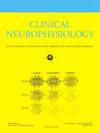经颅电刺激预测面神经功能术后早期疗效的三个蒙太奇。
IF 3.7
3区 医学
Q1 CLINICAL NEUROLOGY
引用次数: 0
摘要
目的我们评估了经颅电刺激(TES)诱发的皮质巴尔运动诱发电位(Cb-MEPs),该诱发电位是在 30 名接受颅底手术的患者接受术中神经监测(IONM)时,用 FCC5h/FCC6h-Mz、C3/C4-Cz 和 C5/C6/-Cz 刺激眼轮匝肌 (Oc) 和眼轮匝肌 (Or) 诱发的。方法:在手术前(T0)和手术后(T1),我们比较了通过 C3/C4-Cz、C5/C6-Cz 和 FCC5h/FCC6h-Mz TES 获得的 Cb-MEP 峰-峰振幅。 然后,我们比较了与不同蒙太奇相关的反应类别(存在、不存在和外周)。最后,我们对每位患者的 Cb-MEPs 数据进行了分类,以确定与临床结果的一致性,并评估了从 FCC5h/FCC6h-Mz、C3/C4-Cz 和 C5/C6-Cz TES 刺激中获得的 Cb-MEPs 数据的诊断措施:在 T0 和 T1,FCC5h/FCC6h-Mz 刺激引起的 Cb-MEP 均大于 C3/C4-Cz,直接激活面神经引起的外周反应小于 C5/C6-Cz。FCC5h/FCC6h-Mz刺激对临床结果显示出最佳的Cb-MEPs准确性和特异性:结论:FCC5h/FCC6h-Mz 刺激在监测面神经功能方面表现最佳,即使在低刺激电压下也能保持出色的诊断效果:我们证明了 FCC5h/FCC6h-Mz TES 蒙太奇用于 IONM 中的 Cb-MEPs 在预测手术后面神经功能结果方面具有良好的准确性。本文章由计算机程序翻译,如有差异,请以英文原文为准。
Three montages for Transcranial electric stimulation in predicting the early post-surgery outcome of the facial nerve functioning
Objective
We assessed the Transcranial Electrical Stimulation (TES)-induced Corticobulbar-Motor Evoked Potentials (Cb-MEPs) evoked from Orbicularis Oculi (Oc) and Orbicularis Oris (Or) muscles with FCC5h/FCC6h-Mz, C3/C4-Cz and C5/C6/-Cz stimulation, during IntraOperative NeuroMonitoring (IONM) in 30 patients who underwent skull-base surgery.
Methods
before (T0) and after (T1) the surgery, we compared the peak-to-peak amplitudes of Cb-MEPs obtained from TES with C3/C4-Cz, C5/C6-Cz and FCC5h/FCC6h-Mz. Then, we compared the response category (present, absent and peripheral) related to different montages. Finally, we classified the Cb-MEPs data from each patient for concordance with clinical outcome and we assessed the diagnostic measures for Cb-MEPs data obtained from FCC5h/FCC6h-Mz, C3/C4-Cz and C5/C6-Cz TES stimulation.
Results
Both at T0 and T1, FCC5h/FCC6h-Mz stimulation evoked larger Cb-MEPs than C3/C4-Cz, less peripheral responses from direct activation of facial nerve than C5/C6-Cz. FCC5h/FCC6h-Mz stimulation showed the best accuracy and specificity of Cb-MEPs for clinical outcomes.
Conclusions
FCC5h/FCC6h-Mz stimulation showed the best performances for monitoring the facial nerve functioning, maintaining excellent diagnostic measures even at low stimulus voltages.
Significance
We demonstrated that FCC5h/FCC6h-Mz TES montage for Cb-MEPs in IONM has good accuracy in predicting the post-surgery outcome of facial nerve functioning.
求助全文
通过发布文献求助,成功后即可免费获取论文全文。
去求助
来源期刊

Clinical Neurophysiology
医学-临床神经学
CiteScore
8.70
自引率
6.40%
发文量
932
审稿时长
59 days
期刊介绍:
As of January 1999, The journal Electroencephalography and Clinical Neurophysiology, and its two sections Electromyography and Motor Control and Evoked Potentials have amalgamated to become this journal - Clinical Neurophysiology.
Clinical Neurophysiology is the official journal of the International Federation of Clinical Neurophysiology, the Brazilian Society of Clinical Neurophysiology, the Czech Society of Clinical Neurophysiology, the Italian Clinical Neurophysiology Society and the International Society of Intraoperative Neurophysiology.The journal is dedicated to fostering research and disseminating information on all aspects of both normal and abnormal functioning of the nervous system. The key aim of the publication is to disseminate scholarly reports on the pathophysiology underlying diseases of the central and peripheral nervous system of human patients. Clinical trials that use neurophysiological measures to document change are encouraged, as are manuscripts reporting data on integrated neuroimaging of central nervous function including, but not limited to, functional MRI, MEG, EEG, PET and other neuroimaging modalities.
 求助内容:
求助内容: 应助结果提醒方式:
应助结果提醒方式:


